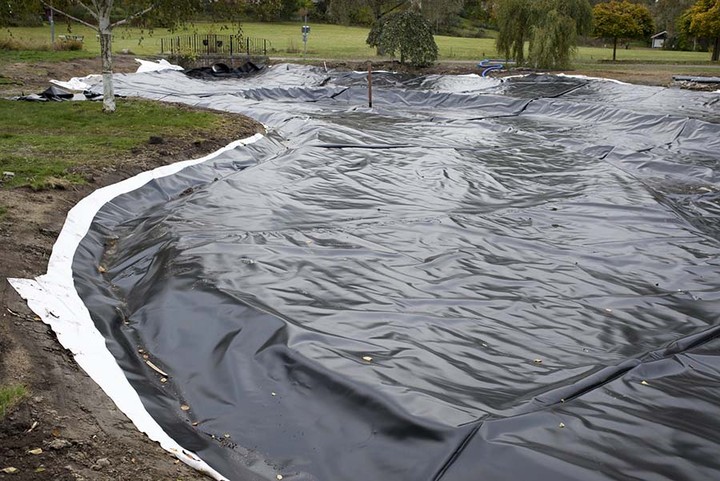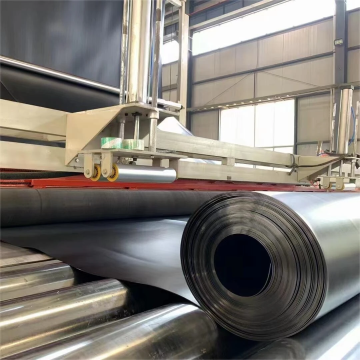Geomembranes are used in most applications such as landfill liners, reservoir anti-seepage, and irrigation networks in agriculture due to the fact that geomembranes have good anti-seepage characteristic. Geomembranes are always subjected to all types of environmental stresses, and the life of geomembranes will be shortened. Of them, ultraviolet radiation and chemical corrosion are the two most critical hazards. It is essential to get familiar with these challenges and take measures to control them to guarantee geomembranes’ long-term performance.

Effects of UV Radiation on Geomembranes
Sunlight ultraviolet radiation is the major factor controlling geomembrane longevity. Geomembrane material photodegradation by continued exposure to UV light will have a chain reaction of adverse consequences. For materials based on polymers commonly utilized in geomembranes, such as polyethylene, UV radiation will cause a chain reaction of molecular chain scission. As a result, the geomembrane becomes brittle, flexibility is lost, and mechanical properties are markedly reduced. Formation of cracks begins on the surface, weakening the integrity of the anti-seepage layer and may result in leakage.
Geomembranes are exposed to the greatest susceptibility to UV deterioration when deployed in the outside environment, i.e., on outdoor reservoirs or short-term landfills. Even in those types of projects wherein the geomembrane would be finally buried underneath soil or some other shield cover, a transitory exposure to UV rays during installation could produce irreparable destruction if installation time protection against sunlight is not furnished. This degradation not only shortens the life of the geomembrane, but also increases the risk of recovery in the form of excessive repair or replacement costs within the project duration.
Chemical Corrosion: Another Serious Threat
Chemical corrosion is another environmental stressor that can affect geomembrane performance. In the majority of applications, geomembranes are likely to come into contact with mixtures of different chemicals, from acids and bases to solvents and salts. Chemicals will react with the material of the geomembrane, generating chemical reactions at the molecular level. For example, strong acids can disintegrate chemical bonds in certain polymers, and certain solvents will either dissolve or make the geomembrane swell up and change its physical properties.
In industrial waste disposal sites, geomembranes come into contact with extremely corrosive chemicals in waste. Further, under agricultural applications, fertilizers, pesticides, and other chemicals introduced into irrigation water also degrade geomembranes over time. Once corrosion has been initiated, spread can be extremely quick, deteriorating the geomembrane’s functionality and reducing its value as a barrier.
Coping Strategies with Environmental Stressors
There are several ways the effects of UV radiation and chemical corrosion can be minimized. The use of geomembranes that incorporate UV stabilizers is one protection method against UV radiation. Either they absorb or reflect UV radiation before it has the opportunity to reach and cause damage to the polymer matrix. Some geomembranes incorporate a coating layer that protects against UV radiation.
When it comes to chemical corrosion, the choice of a suitable geomembrane material is critical. Different polymers have varying degrees of chemical resistance. High-density polyethylene geomembranes, for example, have relatively good resistance against most general chemicals and are hence commonly utilized for most applications. Where the geomembrane is to come into contact with highly corrosive chemicals, specially high chemical-resistant geomembranes may be obtained from reputable geomembrane suppliers.
Another important aspect is proper protection and installation during the construction of the project. Geomembranes are required to have a cover layer placed on top of them once they are applied to shield them from UV exposure. Further geomembrane liners or barriers may be used alongside geomembranes in chemically corrosive environments for enhanced protection. Proper inspection and maintenance are also essential so that any signs of damage or deterioration can be detected and addressed as early as possible.
The Role of Wholesale Geomembrane Manufacturers in Providing Affordable Solutions
Availability of affordable geomembranes without sacrificing their quality is important in most projects. Wholesale geomembrane manufacturers play an important role in such an instance. Wholesale producers of such products have a tendency of working in bulk and thus lower cost of production. By purchasing inexpensive geomembranes from wholesalers, project owners are able to attain low-cost geomembranes but at the same quality needed in such an application.
Reputable wholesale manufacturers also invest in research and development to further the functionality of geomembranes. They create new products that are more durable to environmental factors, like more UV-stable or chemically inert geomembranes. In addition, they can provide technical guidance and support on how to choose the most appropriate geomembrane for specific project needs, and customers get best value for their money.
Conclusion
Overall, environmental stressors such as chemical corrosion and ultraviolet radiation have severe effects on the service life and functionality of geomembranes. All such situations can be easily addressed with appropriate application of countermeasures and use of cost-effective solutions provided by reputable wholesale geomembrane producers. This makes geomembranes effective in any engineering use and long-lasting and cost-effective.
Geoseal is a manufacturer of geomembranes, and we have a professional pre-sales and after-sales team to serve you. Looking forward to doing business with you.
